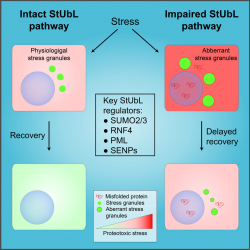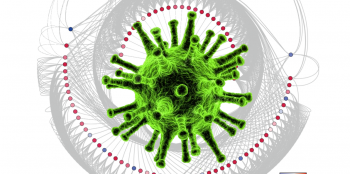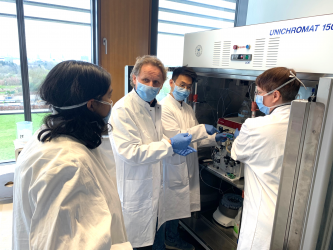News from the Institute

As published in Molecular Cell today, the Müller group has discovered a unique link between SUMO-mediated nuclear protein quality control and cytosolic stress granules (SGs). SGs are ribonucleotide particles that represent a prototypic example of membrane-less organelles. SG assembly is an important stress response that limits protein synthesis to avoid further influx into overloaded proteostasis systems. Typically, SGs rapidly disassemble when stress resolves. This process is impaired in amyotrophic lateral sclerosis (ALS), a neurodegenerative disease, due to mutations in RNA-binding proteins such as FUS or TDP-43. Jan Keiten-Schmitz and coworkers now found that the proper disassembly of SGs upon release of heat or arsenite stress requires both SUMO chain formation and the SUMO-targeted ubiquitin ligase (StUbL) RNF4. Strikingly, they could show that this pathway limits the accumulation of an ALS-causing FUS mutant in SGs. Taken together, these data demonstrate that the StUbL pathway is intricately linked to the dynamics of SGs and might be exploited therapeutically in ALS.
... (read more)
Despite COVID-19 quickly developing to a world-wide pandemic, treatment options remain limited. The mechanisms by which SARS-CoV-2 enters cells, how the cell responds to infection, and which therapeutic approaches could stop viral replication remain unclear. In a manuscript published today in the renowned journal Nature, IBC2 group leader Christian Münch, together with Jindrich Cinatl (Institute of Medical Virology, University Hospital Frankfurt), provide with answers to these questions. Using SARS-CoV-2 isolated from COVID-19 patients in Frankfurt, they established a cellular model to study coronavirus infection. Using a recently developed novel translation proteomics method (https://doi.org/10.1016/j.molcel.2019.11.010), they analysed how viral infection changes cellular protein synthesis and abundance. This revealed several cellular pathways strongly modulated upon SARS-CoV-2 infection. Strikingly, using drugs targeting these pathways – some of which are approved for use in other diseases – prevented SARS-CoV-2 replication in cells. This reveals potential new therapeutic strategies for specific COVID-19 treatments and have been picked up for ongoing (ribavirin) and planned (2-deoxy-glucose) clinical trials.

Kevin Klann, PhD student in the Münch group, receives the Tandem Mass Tag (TMT) bronze level research award 2020 by ThermoFisher Scientific. This annual award is rewarded for presented projects based on their innovation and impact on the work in the field of proteomics. The prize is endowed with 5,000$ worth of mass spectrometry (MS) reagents to enable promising proteomics projects by the lab. The Münch lab recently published a novel MS-based approach to study protein dynamics in the journal Molecular Cell. The award-winning project by Kevin is planning to use this powerful method to study the cellular protein degradation system in its entirety by combining protein dynamics MS and small molecule/CRISPR-Cas9 libraries targeting proteases and the ubiquitin-proteasome system. Thus, it will be possible to study the effect of each individual component of the protein degradation network on the cellular proteome and physiology. Combination of all puzzle pieces will give rise to a new picture of the protein degradation system with implications to cell and disease biology.
... (read more)
Scientists from IBC2 and collaborating teams identified the papain-like protease (PLpro) of SARS-CoV-2 as an essential viral enzyme and potential weak spot, which may even turn out to be its Achilles’ heel. PLpro is required for the processing of viral polypeptides and the assembly of new viral particles within human cells. In addition, SARS-CoV-2 uses this enzyme to dampen the anti-viral immune response, helping the virus to modulate the host’s immune system to its own benefit. By this, the virus can easily multiply and spread further. The team has demonstrated that pharmaceutical targeting of PLpro by a non-covalent inhibitor (GRL-0617) blocks virus spread and increases anti-viral immunity in human epithelial cells, the prime site of pathogen entry. The respective results are now made publicly available on a preprint server.
... (read more)
The European Investment Bank (EIB) regularly invites international thought leaders to write about the most important issues of the day, an essay series dubbed “Big Ideas”. On the occasion of Croatia’s presidency of the EU Council, Croatian-born IBC2 Director Ivan Đikić was asked to contribute his view on the role of modern science in advancing healthcare. In his essay, he analyses the biomedical challenges ahead of us, especially with respect to common diseases like cancer and neurodegeneration, but also those emerging from novel viruses, rare diseases, and – last not least – from environmental and societal changes. He writes about the endurance needed for translational science to succeed, how progress has often lagged behind expectations and why technologies are the key to success. Finally, he shares his thoughts about a needed culture change with respect to drug discovery to ensure fair access of scientific progress around the globe and throughout societies.
... (read more)